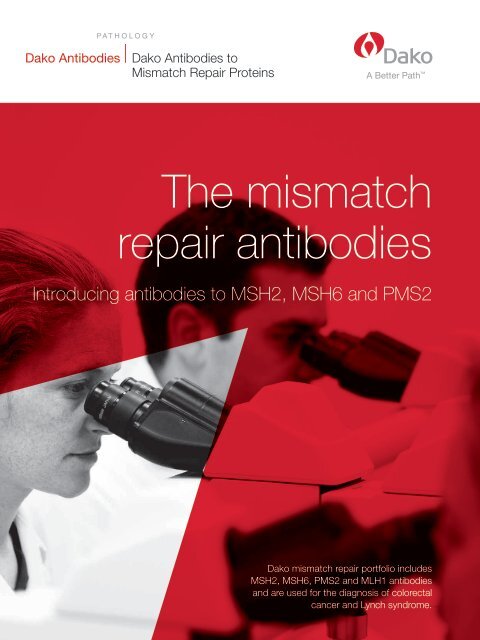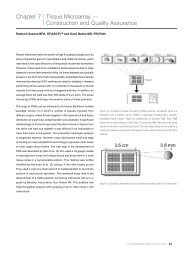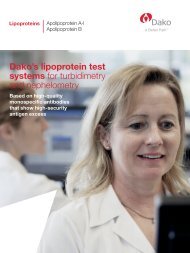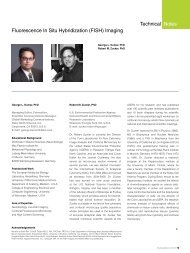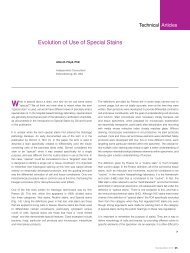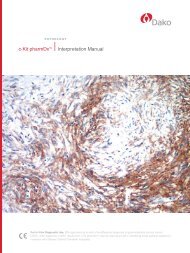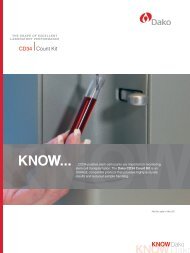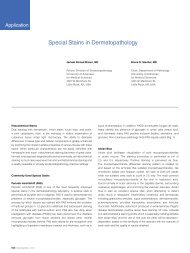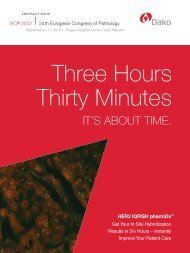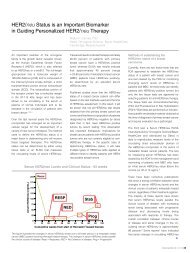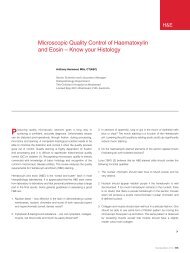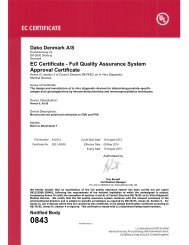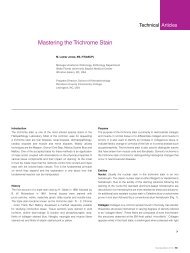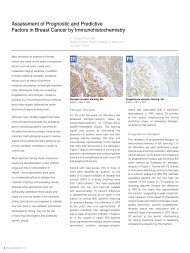The mismatch repair antibodies - Dako
The mismatch repair antibodies - Dako
The mismatch repair antibodies - Dako
Create successful ePaper yourself
Turn your PDF publications into a flip-book with our unique Google optimized e-Paper software.
PATHOLOGY<br />
<strong>Dako</strong> Antibodies<br />
<strong>Dako</strong> Antibodies to<br />
Mismatch Repair Proteins<br />
<strong>The</strong> <strong>mismatch</strong><br />
<strong>repair</strong> <strong>antibodies</strong><br />
Introducing <strong>antibodies</strong> to MSH2, MSH6 and PMS2<br />
<strong>Dako</strong> <strong>mismatch</strong> <strong>repair</strong> portfolio includes<br />
MSH2, MSH6, PMS2 and MLH1 <strong>antibodies</strong><br />
and are used for the diagnosis of colorectal<br />
cancer and Lynch syndrome.
<strong>The</strong> <strong>mismatch</strong> <strong>repair</strong><br />
<strong>antibodies</strong><br />
For the diagnosis of colorectal cancer<br />
and Lynch syndrome<br />
<strong>The</strong> <strong>mismatch</strong> <strong>repair</strong> proteins MSH2, MSH6, PMS2 and MLH1 are nuclear<br />
proteins involved in the DNA <strong>mismatch</strong> <strong>repair</strong> (MMR) pathway. <strong>The</strong> MMR<br />
pathway is utilized by normal proliferating cells to <strong>repair</strong> mutations that<br />
may occur during DNA replication.<br />
Deficiency or loss of MMR function in the gastrointestinal tract results in an<br />
increased mutation rate and contributes to the development of sporadic<br />
colorectal carcinoma as well as hereditary non-polyposis colorectal<br />
carcinoma (HNPCC) also called Lynch syndrome. <strong>The</strong> four <strong>antibodies</strong><br />
are useful for identifying <strong>mismatch</strong> <strong>repair</strong> deficiencies in tumors of the<br />
gastrointestinal tract including HNPCC, and associated extra-colonic<br />
cancers using immunohistochemistry (1,2).<br />
Loss of MMR activity<br />
may result from:<br />
• A hereditary mutation in a<br />
gene(s) coding for a MMR<br />
protein(s)<br />
• A spontaneous loss of MMR<br />
activity, in some cases caused<br />
by methylation-induced gene<br />
silencing<br />
Monoclonal Mouse Anti-Human MutS<br />
Protein Homolog 2 (MSH2), Clone FE11<br />
Colon adenocarcinoma (FFPE) with loss of<br />
MSH2 protein. Stained with FLEX Anti-MSH2,<br />
Code IR085, on Autostainer Link 48.<br />
Monoclonal Rabbit Anti-Human MutS<br />
Protein Homolog 6 (MSH6), Clone EP49<br />
Colon adenocarcinoma (FFPE) with loss of<br />
MSH6 protein. Stained with FLEX Anti-MSH6,<br />
Code IR086, on Autostainer Link 48.<br />
Monoclonal Rabbit Anti-Human Postmeiotic<br />
Segregation Increased 2 (PMS2), Clone EP51<br />
Colon adenocarcinoma (FFPE) with loss of<br />
PMS2 protein. Stained with FLEX Anti-PMS2,<br />
Code IR087, on Autostainer Link 48.<br />
2
<strong>Dako</strong> introduces three high quality rabbit and mouse<br />
monoclonal <strong>antibodies</strong> to <strong>mismatch</strong> <strong>repair</strong> proteins<br />
MLH1<br />
MSH2<br />
PMS2<br />
MSH6<br />
MMR and DNA string showing how the<br />
MMR proteins work in pairs.<br />
Loss of one or more <strong>mismatch</strong> <strong>repair</strong> proteins<br />
is often associated with the loss of a coupled<br />
protein. MLH1 and PMS2 loss are often paired.<br />
MSH2 and MSH6 loss are often paired.<br />
A<br />
G<br />
• Monoclonal Mouse Anti-Human MutS Protein Homolog 2,<br />
Clone FE11 NEW<br />
• Monoclonal Rabbit Anti-Human MutS Protein Homolog 6,<br />
Clone EP49 NEW<br />
• Monoclonal Rabbit Anti-Human Postmeiotic Segregation Increased 2,<br />
Clone EP51 NEW<br />
• Monoclonal Mouse Anti-Human MutL Protein Homolog 1,<br />
Clone ES05<br />
All four in-vitro diagnostic <strong>antibodies</strong> are available as concentrates and<br />
FLEX Ready-To-Use (RTU) primary <strong>antibodies</strong> for use on formalin-fixed,<br />
paraffin-embedded tissue sections.<br />
FLEX RTU <strong>antibodies</strong> are optimized for the Autostainer Link platform.<br />
<strong>Dako</strong> EnVision TM FLEX validated protocol information is retrievable through<br />
bar-coded labeling. Together, the <strong>Dako</strong> FLEX RTU <strong>antibodies</strong><br />
and EnVision TM FLEX visualization system provide:<br />
• Consistently high diagnostic certainty<br />
• Optimized, validated protocol<br />
• Efficient workflow<br />
Monoclonal Mouse Anti-Human MutL<br />
Protein Homolog 1 (MLH1), Clone ES05<br />
Colon adenocarcinoma (FFPE) with loss of<br />
MLH1 protein. Stained with FLEX Anti-MLH1,<br />
Code IR079, on Autostainer Link 48.<br />
3
Ordering information<br />
<strong>The</strong> <strong>mismatch</strong> <strong>repair</strong> <strong>antibodies</strong> are available both as FLEX RTU <strong>antibodies</strong> and as concentrates.<br />
Antibody Description Platform Order Number<br />
Monoclonal Mouse Anti-Human MutS<br />
FLEX RTU 60 tests, 12 mL Autostainer Link 48 IR08561<br />
Protein Homolog 2 , Clone FE11<br />
Concentrate 1 mL - M363901<br />
Concentrate 0.2 mL - M363929<br />
Monoclonal Rabbit Anti-Human MutS<br />
Protein Homolog 6, Clone EP49<br />
Monoclonal Rabbit Anti-Human Postmeiotic<br />
Segregation Increased 2, Clone EP51<br />
Monoclonal Mouse Anti-Human MutL<br />
Protein Homolog 1, clone ES05<br />
FLEX RTU 60 tests, 12 mL Autostainer Link 48 IR08661<br />
Concentrate 1 mL - M364601<br />
Concentrate 0.2 mL - M364629<br />
FLEX RTU 60 tests, 12 mL Autostainer Link 48 IR08761<br />
Concentrate 1 mL - M364701<br />
Concentrate 0.2 mL - M364729<br />
FLEX RTU 60 tests, 12 mL Autostainer Link 48 IR07961<br />
FLEX RTU 30 tets, 12 mL <strong>Dako</strong> Autostainer IS07930<br />
instruments<br />
Concentrate 1 mL - M364001<br />
Concentrate 0.2 mL - M364029<br />
References:<br />
1. Peltomäki P. Role of DNA <strong>mismatch</strong> <strong>repair</strong> defects in the pathogenesis of human cancer. J Clin Oncol 2003;21:1174-79.<br />
2. Lynch H. Smyrk, T. Hereditary nonpolyposis colorectal cancer (Lynch syndrome). An updated review. Cancer 1996; 78:1149-67.<br />
Corporate Headquarters<br />
Denmark<br />
+45 44 85 95 00<br />
www.dako.com<br />
Represented in more<br />
than 80 countries<br />
Australia<br />
+61 3 9357 0892<br />
Austria<br />
+43 1 408 43 34 0<br />
Belgium<br />
+32 (0) 16 38 72 20<br />
Brazil<br />
+55 11 50708300<br />
Canada<br />
+1 905 335 3256<br />
China<br />
+86 21 6327 1122<br />
Denmark<br />
+45 44 85 97 56<br />
Finland<br />
+358 9 348 73 950<br />
France<br />
+33 1 30 50 00 50<br />
Germany<br />
+49 40 69 69 470<br />
Ireland<br />
+353 1 479 0568<br />
Italy<br />
+39 02 58 078 1<br />
Japan<br />
+81 3 5802 7211<br />
<strong>The</strong> Netherlands<br />
+31 20 42 11 100<br />
Norway<br />
+47 23 14 05 40<br />
Poland<br />
+48 58 661 1879<br />
Spain<br />
+34 93 499 05 06<br />
Sweden<br />
+46 8 556 20 600<br />
Switzerland<br />
+41 41 760 11 66<br />
United Kingdom<br />
+44 (0)1 353 66 99 11<br />
United States of America<br />
+1 805 566 6655<br />
29044 21AUG12


